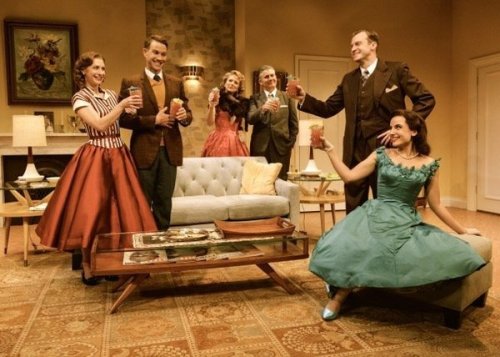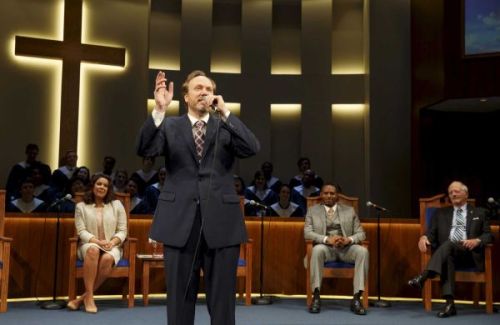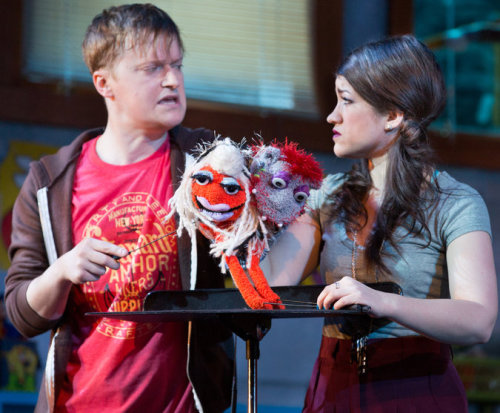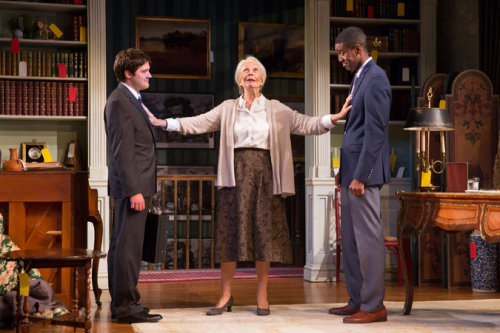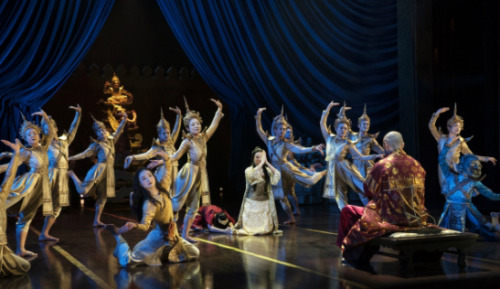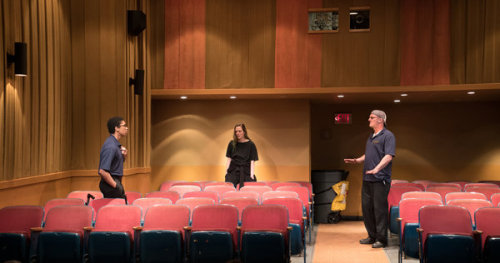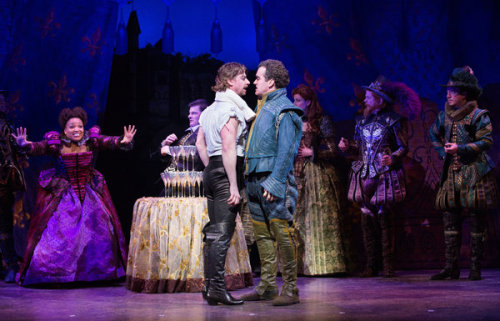
There are musicals designed to be nothing more than entertaining. A Gentleman’s Guide to Love and Murder, Spamalot, Xanadu, Dirty Rotten Scoundrels…no big underlying messages or themes, just a lot of silly (and often clever) fun with the sole aim of making you laugh and taking your mind off your troubles for a couple of hours. Then there are shows like Legally Blonde, Kinky Boots, Hairspray, The Music Man, Fiddler on the Roof which, while still highly entertaining, have a point to make – about feminism, racism, homophobia, anti-semitism…
Something Rotten, currently playing at the St. James Theatre, lies somewhere in between. The silliness here is rampant. Unlike most purely entertaining shows, to get all the jokes here, one must pay close attention, as they come at you like pies in a Mack Sennett movie: fast and from every direction. But the writers here (book by Karey Kirkpatrick & John O’Farrell, music and lyrics by Wayne Kirkpatrick and Karey Kirkpatrick) also have a deeper message to deliver, satirizing our celebrity culture by depicting William Shakespeare as a demanding, egotistical, conceited superstar, feeding off the attention of his fans and the media.
The setup is simple: Nick Bottom (Brian D’Arcy James) and his brother Nigel (John Cariani) are Elizabethan era theatrical producers/writers, hungry for a hit. Especially since their former acting companion, Shakespeare (the brilliant Christian Borle) is the toast of London, grabbing all the attention and much of the money. But when the investor in their new play about Richard II pulls out because he’s heard Shakespeare is writing his own Richard II play, the Bottom brothers need to find inspiration.
Nick turns to – who else? – Nostradamus, who peers into the future and tells Nick the Bard’s biggest hit will be called “Omelette,” and that in the future, the biggest thing in theatre will be something called “musicals.”
From there, the silliness shifts into overdrive. If you try to keep track of all the musical and Shakespearean references, you’ll have your hands full, because there must be at least 50 of each – in songs, in dialogue, in physical business. The Bottom brothers strive to get their new musical onto a stage, while Shakespeare lurks around every corner, looking to steal ideas and lines from Nigel Bottom, who is the writer of the pair.
There are a couple of terrifically fun songs (especially “A Musical” and “Right Hand Man”), a beautifully-detailed (and highly-flexible) set from scenic designer Scott Pask, and a talented and energetic cast.
Something Rotten is something silly, but also something a little bit wonderful.
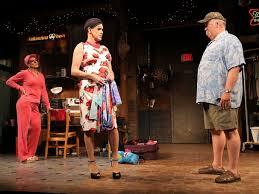
Like so many powerful things, the male ego can have both a dark and light side. Casey (Dave Thomas Brown) is a perfect illustration of this. As an Elvis impersonator, he always feels on the edge of stardom. That the next performance will be the one that propels him to bigger stages with larger audiences and brighter lights. For now, however, Casey is stuck in a Florida panhandle dive bar, lip-synching Elvis tunes to crowds you could count with the fingers of one hand. When his girlfriend Jo (a charming Afton Williamson) reveals she is pregnant, Casey is elated, and stands ready to do his fatherly duty. Unfortunately, he doesn’t have much of a plan beyond getting a new sequined jumpsuit to brighten up his act.
But when the joint he’s working decides to dump his Elvis act for a drag show, Casey stays on as a bartender, even though his ego prevents him from telling Jo about the demotion. And that male ego really prevents him from letting her in on the news when one night he is pressed (and dressed) into service on stage in the drag extravaganza, becoming the titular Georgia McBride. Turns out Casey is a far better performer when he’s being a queen instead of The King.
Playwright Matthew Lopez is best-known for his quite excellent drama The Whipping Man (which I enjoyed immensely in its run at Marin Theater Company), so the comic bitchiness on display here might seem a little surprising. But the shade being thrown here (mostly from Matt McGrath as the alpha queen, Tracy Mills) is often in the service of larger themes of self-acceptance and holding true to ideals. Especially, for Casey, the ideal of being a man who can support his family. But since he’s supporting that family primarily on tips tucked into his bra, Casey’s ego (and the secrecy it induces) will get him into some serious trouble before the curtain falls.
This is a delightful, if somewhat lightweight, production, staged with just the right amount of dumpy splendor at the Lucille Lortel Theatre in Greenwich Village.
